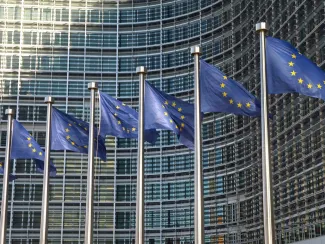
On 12 July, following an extended cabinet meeting at Chequers, the UK Government published its white paper setting out its preferred view of what Britain’s future relationship with the EU will look like. The white paper will guide the government’s approach to Brexit negotiations.
It envisages:
Trading goods in post-brexit Britain
Trade in goods (including agricultural goods) will continue almost exactly as before, with the UK mostly following EU rules in return for continued single-market access. While in principle Parliamentary approval would be required for any change in EU rules, realistically it would have little option but to do so without risking this entire arrangement. Effectively the government is seeking a single market for goods only, to ensure frictionless trade and avoid a hard border in Northern Ireland. A mechanism would also be agreed to allow continued recognition of ECJ case law.
Customs
The proposed customs arrangement would provide for the trade in goods “as if” a customs union were in place, while allowing the UK to control its tariffs on trade with non-EU countries. The UK would collect tariffs on EU-bound goods on the EU’s behalf and vice versa. Elements of the “maximum facilitation” solution proposed by certain members of the cabinet also feature, such as using technology to smooth the cross-border transportation of goods. The white paper confirms that the arrangement would be phased in over a period of 12 to 18 months after the transition period ends in December 2020.
Services: post-Brexit access to EU markets?
The white paper seeks to maintain current levels of EU market access for the majority of the service sector. For financial services, market access would be facilitated via an enhanced equivalence regime, although the UK will cease to be a member of the EU’s ‘passporting’ system. This means UK companies that have been able to sell services in the EU with minimal additional authorisation, will lose this right. As such, the white paper acknowledges that there will be more barriers to the UK’s access to the EU market than is the case today.
Agencies
The white paper seeks to retain UK membership of several EU agencies, such as those for chemicals, aviation and medicines. The white paper envisages “active participation” instead of full membership, which would involve agency budget contributions without voting rights, although the UK’s views would likely remain influential.
Brexit, freedom of movement and immigration
The government has consistently sought a reduction in immigration as a priority during the Brexit negotiation and the white paper specifically mentions this as an objective. It does, however, offer concessions (in the form of special rights for EU citizens) to encourage the EU to relax its insistence on the “indivisibility” of the four freedoms.
The white paper’s “framework for mobility” includes visa-free travel for tourism and business trips, mobility for students, and helping businesses acquire “talented people”. It also leaves open the possibility of a reciprocal agreement governing benefit entitlement.
What was missing in the government's Brexit white paper?
Some topics were conspicuous by their absence. There was little mention of contentious areas such as fishing rights, the Northern Irish border and continuation of Protected Geographical Indicator (PGI) status under which only products manufactured in the place concerned can be so described (Arbroath Smokies, Stornoway Black Pudding, etc.)
The hope for the food and drinks sector is that in return for recognition of the PGI status of EU products, such as Parma Ham, reciprocal rights for UK products would be granted in the EU. Non-EU countries with whom separate trade deals might need to be brokered may not extend that reciprocity; the USA is believed to be hostile to PGI, and the battleground over food safety and hygiene standards being relaxed to allow, say, chlorine-washed chicken from the US to be imported into the UK, will no doubt form part of the bargaining counters in that situation.
What happens now?
The white paper represents the most detailed plan for the future relationship between the UK and the EU. However, it poses several questions:
How will it be received by the EU?
The European Parliament's Brexit Steering Group has already responded, and while it welcomed the clarity offered by the white paper, it stressed the indivisibility of the four freedoms. It signalled particular scepticism at the UK’s proposal to “outsource” the EU’s customs competences. The Brexit Steering Group also pressed the government to clarify its stance on the “backstop” arrangement for Northern Ireland so that the withdrawal agreement can be concluded at the earliest opportunity.
Will Parliament back the government?
Even if the EU were to agree to the current proposals, the government’s lack of a House of Commons majority may make its passage difficult. The white paper seeks to find a common ground between Eurosceptic and pro-EU members of parliament, risking satisfying neither. Amendments have already been made to Brexit legislation that could undermine the position set out in the white paper, such as an amendment to the Customs Bill that would make it illegal for the UK to pay tariffs to the EU that it had collected on its behalf without a reciprocal agreement in place.
To ratify any deal, the government may require the support of Labour, the Liberal Democrats and the SNP, although it remains to be seen if this will be possible in practice. In the weeks since the publication of the white paper, there have been growing calls for a second referendum, including from Nicky Morgan, former Conservative cabinet minister and Chair of the Commons Treasury Select Committee, for a three-option vote: the deal negotiated by the government, a no-deal Brexit, or to remain in the EU. This suggestion has gained traction in recent weeks with the support of Gina Miller, Sir John Major, and the People’s Vote group (a campaign group with cross-party support). The Independent has also launched a campaign seeking a second referendum.
Additional reporting by Daniel Boynton